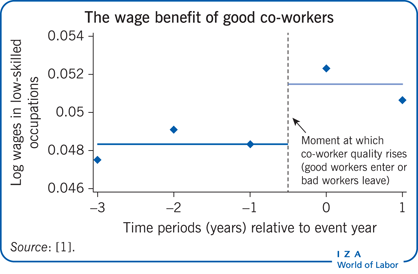Elevator pitch
Should one expect a worker’s productivity, and thus wage, to depend on the productivity of his/her co-workers in the same workplace, even if the workers carry out completely independent tasks and do not engage in team work? This may well be the case because social interaction among co-workers can lead to productivity spillover through knowledge spillover or peer pressure. The available empirical evidence suggests that, due to such peer effects, co-worker productivity positively affects a worker’s own productivity and wage, particularly in lower-skilled occupations.
Key findings
Pros
Peer effects in co-worker productivity have been documented for low-skilled occupations, such as supermarket cashiers, soft-fruit pickers, salespeople, and call center workers.
Evidence suggests social interaction can lead to knowledge spillover from newly trained to untrained workers
The likely channel of productivity spillover in low-skilled settings is peer pressure; this can also help overcome free-rider problems.
Emerging representative studies complement evidence from lab and field experiments, producing an increasingly consistent and reliable body of evidence.
Cons
Productivity spillover among co-workers in high-skilled occupations has been documented for school teachers, but not for academics, scientists, and inventors, unless they actively collaborate on a project.
The current evidence does not point toward knowledge transfer as an important channel of productivity spillover in general workplace settings.
Firms with excessively high peer pressure are likely to face extra costs in retaining workers.
In many settings it is difficult to measure worker and co-worker productivity or to establish causation among the two, which limits researchers’ ability to accurately determine productivity spillover.
